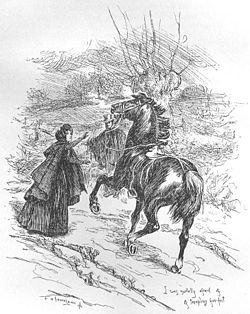Gytrash

The Gytrash /ɡaɪˈtræʃ/[citation needed], a legendary black dog known in northern England, was said to haunt lonely roads awaiting travelers.[1] Appearing in the shape of horses, mules, or dogs, the Gytrash haunt solitary ways and lead people astray but they can also be benevolent, guiding lost travelers to the right road. They are usually feared.
In some parts of Lincolnshire and Yorkshire, the Gytrash was known as the "Shagfoal" and took the form of a spectral mule or donkey with eyes that glowed like burning coals. In this form, the beast was believed to be purely malevolent.
As this horse approached, and as I watched for it to appear through the dusk, I remembered certain of Bessie's tales, wherein figured a North-of-England spirit called a "Gytrash," which, in the form of horse, mule, or large dog, haunted solitary ways, and sometimes came upon belated travelers, as this horse was now coming upon me. It was very near, but not yet in sight; when, in addition to the tramp, tramp, I heard a rush under the hedge, and close down by the hazel stems glided a great dog, whose black and white colour made him a distinct object against the trees. It was exactly one form of Bessie's Gytrash -- a lion-like creature with long hair and a huge head [...], with strange pretercanine eyes [...]. The horse followed, -- a tall steed [...]. Nothing ever rode the Gytrash: it was always alone [...].
The Gytrash's emergence as Rochester's innocuous dog Pilot has been interpreted as a subtle mockery of the mysteriousness and romanticism that surrounds his character and which clouds Jane's perception.[3] Brontë's reference in 1847 is probably the earliest reference to the beast and forms the basis for subsequent citations.[4]
Harry Potter
In the third book in the Harry Potter series, Harry Potter and the Prisoner of Azkaban, a mysterious Gytrash-like large black dog appears to Harry several times while he is alone in dark places (here referred to as a Grim, an omen of death). However, in the end it is revealed to be his godfather Sirius Black in animal form. Interestingly, Gytrashes are featured in the video game adaptations of the early installments of the series, as a large, vicious, nocturnal spectral dog, that can only be kept at bay by using light.
See also
- Charlotte Brontë: Jane Eyre
- Barghest
- The Hound of the Baskervilles
- The Guytrash is a character in Trap In Time and The Host Rides Out by Celia Rees
- Alan Moore: Voice of the Fire - first chapter, "Hob's Hog." Referred to as 'shagfoal'
References
- ^ Brewer, E. Cobham (1894) [First Published in 1870]. Brewer's Dictionary of Phrase and Fable.
- ^ Brontë, Charlotte (1847) [First Published in 1847]. "Chapter XII". Jane Eyre. London, England: Smith, Elder & Co. Retrieved 2008-11-15.
- ^ Dr. Sally Minogue (1999). "Introduction". Jane Eyre. p. xv. ISBN 978-1-85326-020-9.
- ^ Wood, Dr. Juliette. "Gytrash" (PDF): 2. Retrieved 2009-01-13.
{{cite journal}}: Cite has empty unknown parameter:|doi_brokendate=(help); Cite journal requires|journal=(help)
